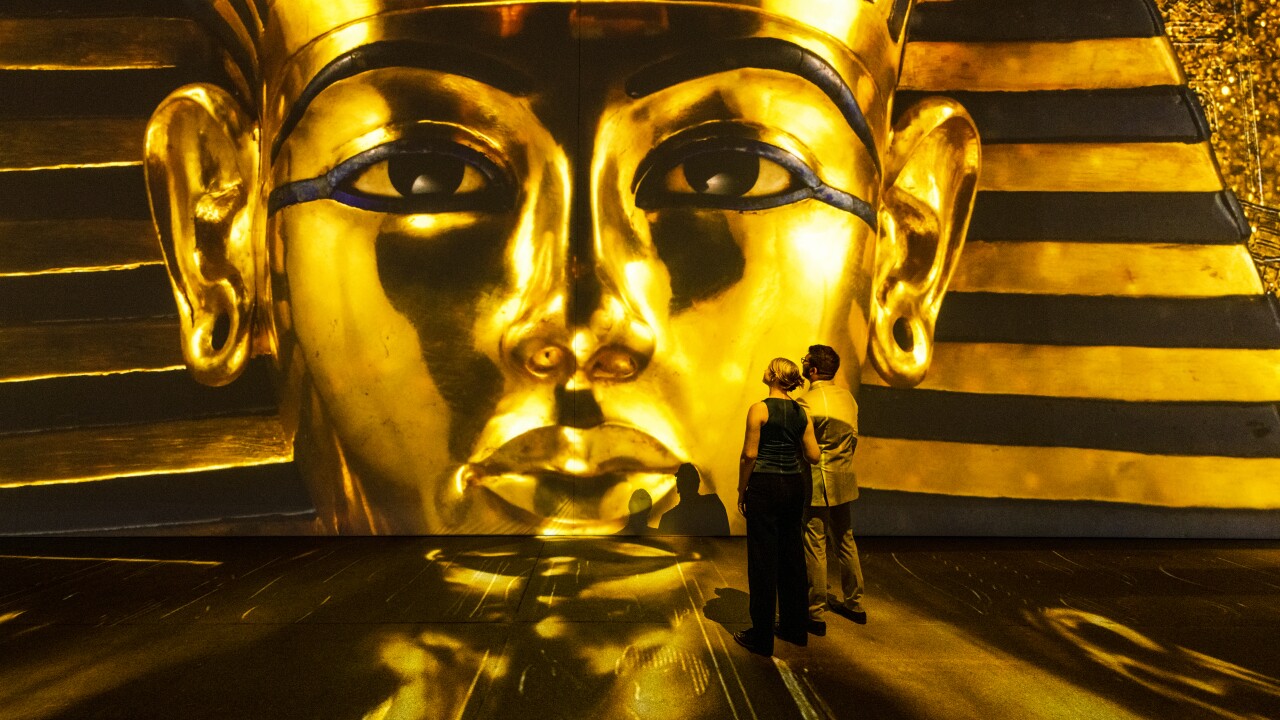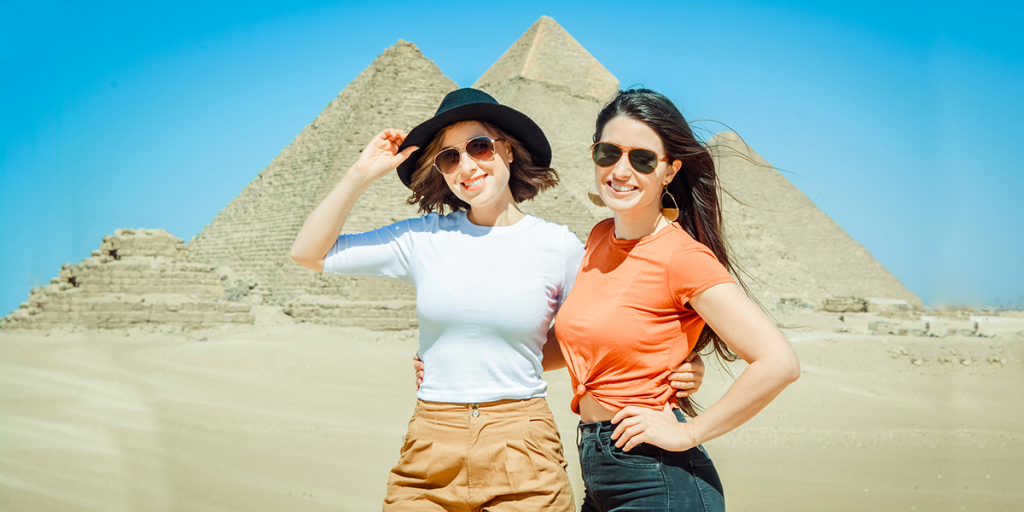
The Most Famous Ancient Egyptian Temples
The ancient Egyptian temples stand as enduring sanctuaries, embodying the profound connection between the mortal and divine realms of ancient Egypt. These architectural marvels were not mere structures; they were revered as the abodes of deities, where the gods themselves came into existence at the dawn of creation. Rooted in their unique understanding of the universe’s birth, the temples’ design mirrored the very cosmic order they sought to uphold.
Functioning as centers of devotion, the temples were where a rich tapestry of rituals unfolded, an intricate weave of offerings and ceremonies dedicated to the gods. Both the public and pharaoh alike came to bestow their reverence upon the divine entities that shaped their lives. Beyond their spiritual significance, the temples served as custodians of history, inscribed with the accounts of kings, queens, and the religious doctrines and myths that formed the bedrock of their era.
Of the numerous architectural marvels, the most renowned ancient Egyptian temples are nestled in the embrace of Luxor and Aswan, two cities that straddle the majestic Nile River. The temples of Luxor, such as the monumental Karnak Temple and the serene Luxor Temple, bear witness to the grandeur and devotion of this civilization. Aswan’s Philae Temple, gracefully poised on an island, pays homage to the goddess Isis, embodying a dedication that transcends time.

Abu Simbel Temple is a remarkable archaeological site located in southern Egypt, near the border with Sudan. Built during the reign of Pharaoh Ramses II in the 13th century BC, the temple complex consists of two massive rock-cut temples dedicated to Ramses II and his queen, Nefertari. The temples were relocated in an impressive feat of modern engineering to prevent them from being submerged by the Aswan High Dam’s reservoir. Our guided tour offers you the chance to marvel at the monumental statues, intricate reliefs, and the story of a monument preserved for the ages View Tour Details

Edfu Temple, also known as the Temple of Horus, stands as one of Egypt’s most well-preserved ancient monuments. Dedicated to the falcon-headed god Horus, the temple’s construction began in the Ptolemaic period and was completed during the reign of the Roman Emperor Claudius. The temple’s architecture, carvings, and reliefs provide a vivid glimpse into the religious practices and beliefs of ancient Egyptians. Our guided tour offers you the unique opportunity to immerse yourself in the awe-inspiring ambiance of Edfu Temple and connect with the spiritual energy that has endured for centuries View Tour Details

Karnak Temple, a complex of temples, pylons, courts, and statues, stands as one of the most significant and extensive religious sites of ancient Egypt. Dedicated to the worship of various deities, including Amun, Mut, and Khonsu, the temple’s construction spanned over 2,000 years. The complex showcases the architectural achievements and religious devotion of different pharaohs and dynasties. Our guided tour offers you the unique opportunity to walk in the footsteps of history, admire the monumental structures, and unravel the stories hidden within Karnak’s stone walls View Tour Details

Kom Ombo Temple stands as a rare dual temple dedicated to two Egyptian deities, Horus the Elder and Sobek. Located on the banks of the Nile River, the temple complex is known for its symmetrical design and the fascinating reliefs that adorn its walls. Our guided tour offers you the opportunity to delve into the unique spiritual and historical significance of the temple, as well as the interplay between these two powerful gods in ancient Egyptian mythology View Tour Details

Philae Temple, dedicated to the goddess Isis, is a masterpiece of ancient Egyptian architecture and devotion. Located on Philae Island near Aswan, the temple complex was the center of worship for Isis and Osiris. The temple’s relocation to Agilkia Island ensured its preservation in the face of rising waters due to the construction of the Aswan High Dam. Our guided tour offers you the chance to bask in the serenity of Philae Temple’s surroundings, admire its intricate carvings, and connect with the goddess Isis’ enduring legacy View Tour Details
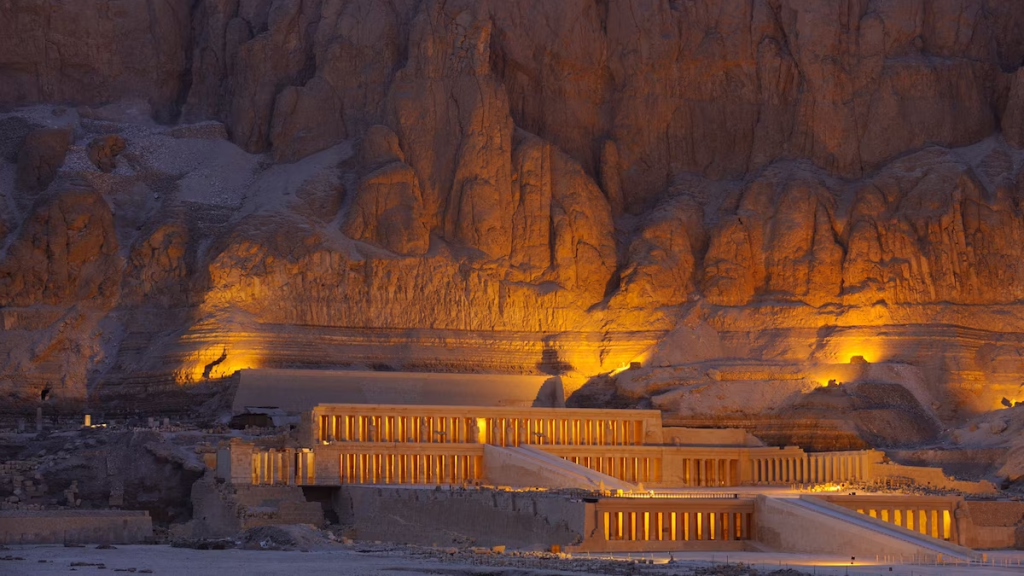
Queen Hatshepsut Temple, also known as Djeser-Djeseru, is a stunning mortuary temple nestled against the cliffs of Deir el-Bahari near Luxor. Queen Hatshepsut, one of Egypt’s few female pharaohs, commissioned this grand temple as a tribute to her reign and achievements. The temple’s design, with its unique colonnaded terraces, stands as a testament to her innovative approach to architecture and rule. Our guided tour offers you the opportunity to explore the temple’s history, reliefs, and the fascinating story of the woman who defied convention to become a pharaoh View Tour Details

The Colossi of Memnon are two massive stone statues of Pharaoh Amenhotep III that once guarded the entrance to his mortuary temple. Standing at over 18 meters in height, these statues are remnants of a grand monument that has long since disappeared. The statues’ name, “Memnon,” comes from the ancient Greek myth of Memnon, the son of the dawn goddess Eos. Our guided tour offers you the chance to stand in the presence of these monumental structures, learn about their history, and ponder the mysteries of their creation View Tour Details

Abydos Temple, dedicated to the god Osiris, is a testament to the ancient Egyptians’ profound reverence for the afterlife. The temple complex, located in Upper Egypt, houses some of the most intricate and well-preserved reliefs from ancient Egypt. Abydos was considered a sacred pilgrimage site, and the temple’s carvings offer insights into the mythology, rituals, and beliefs surrounding the god Osiris and the pharaohs. Our guided tour allows you to step back in time, exploring a place where the spiritual and the earthly converged View Tour Details
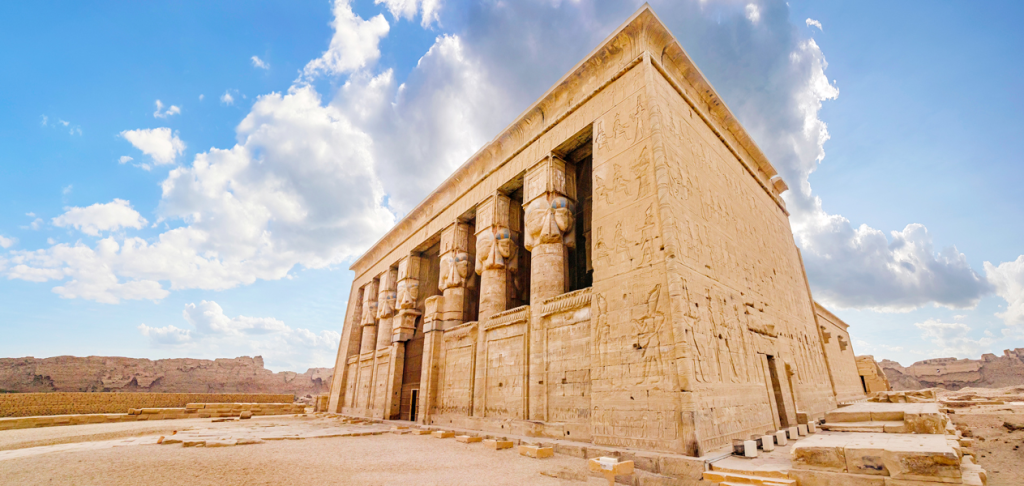
The Dendera Temple Complex, located on the west bank of the Nile, is dedicated to Hathor, the goddess of love, music, and joy. This sprawling complex features stunning reliefs, colorful ceilings, and well-preserved carvings that offer insights into ancient Egyptian religious practices and beliefs. The complex includes the main temple of Hathor, as well as smaller shrines and chapels. Our guided tour allows you to immerse yourself in the world of Hathor, explore the temple’s artistic treasures, and learn about the goddess’s significance in ancient Egyptian culture View Tour Details
Book Your Egypt Holiday to Enjoy the Egyptian Temples
At Egypt Tours Expert, we present you with a myriad of possibilities to embark on this remarkable voyage. Our meticulously crafted Egypt tour packages and Nile River cruises are a gateway to the heart of these awe-inspiring temples. With the guidance of our seasoned Egyptologist tour guides, you will traverse the corridors of time, uncovering the stories etched in stone and the spiritual fervor that animated these sanctuaries.
Embark on an unforgettable 4-day tour package to Cairo and Abu Simbel, where ancient wonders and majestic temples await. Explore the iconic sites of Cairo, including the pyramids of Giza and the Egyptian Museum, before journeying to Abu Simbel to witness the breathtaking temples of Ramses II and Nefertari. With our carefully curated itinerary, knowledgeable guides, and inclusive services, this tour offers a compact yet immersive experience of Egypt’s rich history. Discover the secrets of the pharaohs, marvel at awe-inspiring architecture, and create lasting memories View Tour Details
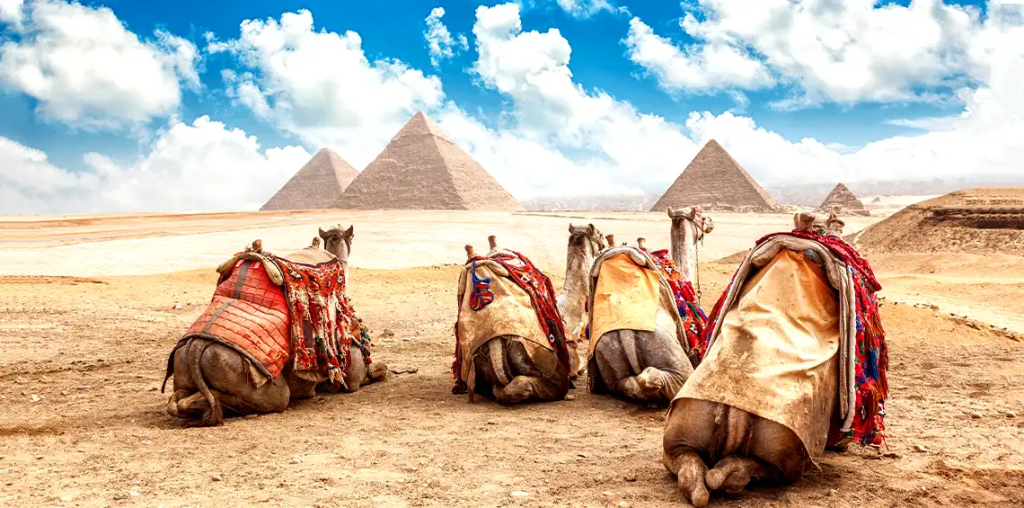
5 Days Cairo and Alexandria Tour Package
Embark on a 5-day journey through Egypt’s most fascinating cities, Cairo and Alexandria. From the grand pyramids and ancient temples to the coastal beauty and cultural landmarks, this tour package is designed to showcase the best of both worlds. With expert guides, comfortable accommodations, and convenient transportation, you’ll have an immersive and hassle-free experience. Join us on this captivating adventure and create memories that will last a lifetime View Tour Details

6 Days Cairo, Luxor, Aswan & Abu Simbel Package
Embark on an extraordinary 6-day journey through the heart of ancient Egypt with our Cairo, Luxor, Aswan & Abu Simbel package. Begin your adventure in Cairo, where you’ll explore the iconic pyramids and delve into the treasures of the Egyptian Museum. Continue to Luxor and Aswan, where you’ll witness the grand temples along the Nile River, and conclude your tour with a visit to the awe-inspiring temples of Abu Simbel. With expert guides, comfortable accommodations, and hassle-free transportation, this package offers a comprehensive exploration of Egypt’s historic sites. Join us on this incredible journey and unlock the secrets of the pharaohs View Tour Details

7 Days Cairo, Luxor & Alexandria Tour
Experience the best of Egypt’s cultural and coastal attractions with our 7-day Cairo, Luxor & Hurghada holiday. Begin your journey in Cairo, where you’ll discover the iconic Pyramids of Giza, explore the ancient artifacts at the Egyptian Museum, and immerse yourself in the vibrant atmosphere of Egypt’s capital. Then, travel to Luxor, often referred to as the world’s greatest open-air museum, where you’ll explore magnificent temples, tombs, and archaeological sites. Finally, unwind in the idyllic beach destination of Hurghada, known for its pristine beaches and vibrant marine life View Tour Details
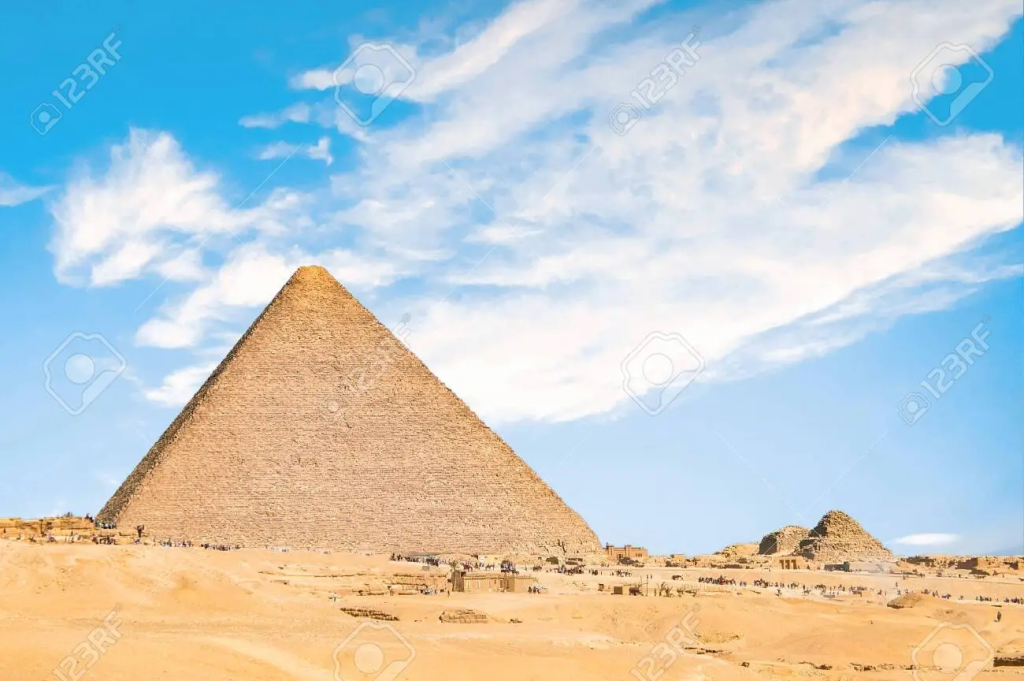
8 Days Cairo, Abu Simbel, Luxor & Hurghada
Experience the best of Egypt’s ancient wonders and coastal charm on our 8-day Cairo, Abu Simbel, Luxor & Hurghada tour. From the vibrant streets of Cairo to the awe-inspiring temples of Abu Simbel and the captivating historical sites of Luxor, this itinerary offers a perfect blend of cultural exploration and relaxation. Conclude your journey in the picturesque beachside town of Hurghada, where you can unwind and soak up the sun. Join us for an unforgettable adventure through Egypt’s rich heritage and natural beauty View Tour Details

9 Days Alexandria, Cairo & Sharm El Sheikh Holiday
Experience the perfect combination of history and relaxation with our 9-day Alexandria, Cairo & Sharm El Sheikh Holiday. Begin your journey in Alexandria, where you’ll discover the Greco-Roman ruins and the impressive Bibliotheca Alexandrina. Continue to Cairo to explore the iconic pyramids, bustling markets, and historic landmarks. Finally, head to the idyllic coastal paradise of Sharm El Sheikh, where you can indulge in snorkeling, diving, or simply bask in the sun on beautiful beaches. This itinerary is designed to provide a comprehensive and memorable vacation in Egypt View Tour Details
Ancient Egyptian Temples FAQs
- What are ancient Egyptian temples? Ancient Egyptian temples were religious structures built by the ancient Egyptians to honor and worship their gods and goddesses. These temples held great cultural and religious significance.
- What was the purpose of ancient Egyptian temples? Temples served as places of worship, rituals, and ceremonies dedicated to various deities. They were also centers of administration, education, and cultural activities.
- How were ancient Egyptian temples constructed? Temples were typically built using locally sourced materials, such as limestone and sandstone. They featured impressive architecture, intricate carvings, pylons, courtyards, and hypostyle halls.
- What is the significance of the pylon in ancient Egyptian temples? The pylon is a monumental gateway that marks the entrance to a temple. It often features inscriptions, carvings, and statues and symbolizes the threshold between the earthly and divine realms.
- What was the role of priests in ancient Egyptian temples? Priests played a crucial role in temple rituals, maintaining the temple, and performing religious ceremonies to appease the gods and ensure the well-being of society.
- Which are some famous ancient Egyptian temples? Some notable temples include the Temple of Luxor, Temple of Karnak, Temple of Hatshepsut (Deir el-Bahari), Abu Simbel Temples, and the Temple of Edfu.
- What was the importance of the Temple of Luxor? The Temple of Luxor was dedicated to the god Amun-Ra and served as a center for festivals, rituals, and processions during ancient Egyptian times.
- Why is the Temple of Karnak significant? The Temple of Karnak is one of the largest religious complexes ever built and was dedicated to Amun-Ra, the chief god. It features monumental hypostyle halls and impressive obelisks.
- What is unique about the Temple of Hatshepsut (Deir el-Bahari)? The Temple of Hatshepsut is characterized by its terraced architecture and the use of ramps to connect different levels. It honors Queen Hatshepsut, one of ancient Egypt’s few female pharaohs.
- Why are the Abu Simbel Temples famous? The Abu Simbel Temples, located in southern Egypt, were built by Pharaoh Ramesses II and are renowned for their colossal statues and relocation to save them from flooding.
- What is the significance of the Temple of Edfu? The Temple of Edfu, dedicated to the god Horus, is one of the best-preserved ancient Egyptian temples. It showcases the architectural features and inscriptions of its time.
- How were ancient Egyptian temples decorated? Temples were adorned with intricate carvings, hieroglyphics, and paintings depicting religious scenes, rituals, and offerings to the gods.
- What were the purposes of the offering halls in temples? Offering halls were areas where priests presented offerings to the gods, such as food, beverages, and incense, as part of their religious rituals.
- Did ancient Egyptian temples have specific festivals and ceremonies? Yes, temples held various festivals and ceremonies throughout the year to honor different gods and commemorate significant events.
- How were ancient Egyptian temples connected to the Nile River? Many temples were strategically located near the Nile River, as the Nile held great importance in ancient Egyptian life and rituals. Temples might have ceremonial processions to the river.
- Did temples play a role in the afterlife beliefs of ancient Egyptians? Yes, temples were considered places where the living could communicate with the gods and where offerings could be made to ensure a favorable afterlife.
- Were there temples dedicated to specific gods or goddesses? Yes, many temples were dedicated to specific deities associated with various aspects of life, such as fertility, protection, wisdom, and the afterlife.
- How does the architecture of ancient Egyptian temples reflect their religious beliefs? The architecture of temples, with their axis, layout, and symbolic elements, reflected the ancient Egyptian worldview and their beliefs about the cosmos and the divine.
- What impact did ancient Egyptian temples have on art and architecture? Ancient Egyptian temples greatly influenced the art and architecture of their time and subsequent periods. Their designs, proportions, and motifs were emulated in various contexts.
- Can visitors explore ancient Egyptian temples today? Yes, many ancient Egyptian temples are open to visitors, allowing them to experience the grandeur of these historical and sacred sites and learn about the rich history and culture of ancient Egypt.
